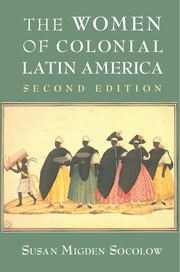Book contents
- Frontmatter
- Dedication
- Contents
- List of Figures
- Acknowledgments
- Introduction: Why Women?
- Chapter One Iberian Women in the Old World and the New
- Chapter Two Before Columbus: Women in Indigenous America and Africa
- Chapter Three Conquest and Colonization
- Chapter Four The Arrival of Iberian Women
- Chapter Five Women, Marriage, and Family
- Chapter Six Elite Women
- Chapter Seven The Brides of Christ and Other Religious Women
- Chapter Eight Women and Work
- Chapter Nine Women and Slavery
- Chapter Ten Women and Social Deviance
- Chapter Eleven Women and Enlightenment Reform
- Conclusion
- Documents
- Suggested Further Reading
- Index
- Plate section
- References
Chapter Eleven - Women and Enlightenment Reform
Published online by Cambridge University Press: 05 February 2015
- Frontmatter
- Dedication
- Contents
- List of Figures
- Acknowledgments
- Introduction: Why Women?
- Chapter One Iberian Women in the Old World and the New
- Chapter Two Before Columbus: Women in Indigenous America and Africa
- Chapter Three Conquest and Colonization
- Chapter Four The Arrival of Iberian Women
- Chapter Five Women, Marriage, and Family
- Chapter Six Elite Women
- Chapter Seven The Brides of Christ and Other Religious Women
- Chapter Eight Women and Work
- Chapter Nine Women and Slavery
- Chapter Ten Women and Social Deviance
- Chapter Eleven Women and Enlightenment Reform
- Conclusion
- Documents
- Suggested Further Reading
- Index
- Plate section
- References
Summary
From the youngest age all [the women of Buenos Aires] are instructed in the essential principles of our wonderful religion; and joining the endowments of their spirit with those of their heart, the ease of learning with the dedication to know more everyday through a wise education, they make such rapid progress that they possess, not only the principles of their native language, but they also know how to create, read, and write with admirable dominion, exactitude and correctness. And in addition to dogma, the mysteries, and the basic tenets of Christian morality, some of them repeat the most well known passages of both Testaments, [as well as] the history, progress, and actual state of our religion. Some know how to discuss the climate, government, religion, laws, character, and customs of many European nations; and there are even some who have been instructed in French and English and can produce a moderate translation.
The eighteenth century, first in the Iberian Peninsula and then in Latin America, was a century of reform. Influenced by the French philosophes, a new generation of Spanish and Latin American writers began to spread innovative ideas about the nature of knowledge, rational thinking, and economic advancement. At the same time, Iberian governments moved to tighten their control over the inhabitants of the colonies and, in the case of Spanish America, to regulate what they viewed to be social disorder. How did these changes affect colonial women and their position in society?
Throughout Latin America, spurred by Enlightenment thought and a desire to improve the economic potential of the colonies, the condition of women gradually emerged as a public issue. By the last decades of the eighteenth century, creole intellectuals, following peninsular thinkers such as Feijóo, began to publish pieces that questioned the status of women in society and suggested change. To the best of our knowledge, all of these authors were men. Nonetheless their writings, primarily newspaper articles, reflect a new awareness among the intellectual elite of the role of women in Latin American society. Foremost in these writings about women was a concern with improving women’s inferior social position through education.
- Type
- Chapter
- Information
- The Women of Colonial Latin America , pp. 177 - 189Publisher: Cambridge University PressPrint publication year: 2015

